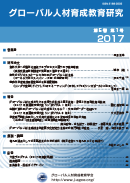Volume 5, Issue 1
Displaying 1-9 of 9 articles from this issue
- |<
- <
- 1
- >
- >|
-
2017Volume 5Issue 1 Pages i
Published: 2017
Released on J-STAGE: January 11, 2023
Download PDF (821K)
-
2017Volume 5Issue 1 Pages 1-12
Published: 2017
Released on J-STAGE: January 11, 2023
Download PDF (1528K) -
2017Volume 5Issue 1 Pages 13-22
Published: 2017
Released on J-STAGE: January 11, 2023
Download PDF (1421K) -
2017Volume 5Issue 1 Pages 23-35
Published: 2017
Released on J-STAGE: January 11, 2023
Download PDF (2466K)
-
2017Volume 5Issue 1 Pages 36-37
Published: 2017
Released on J-STAGE: January 11, 2023
Download PDF (1251K) -
2017Volume 5Issue 1 Pages 38-39
Published: 2017
Released on J-STAGE: January 11, 2023
Download PDF (1143K) -
2017Volume 5Issue 1 Pages 40-49
Published: 2017
Released on J-STAGE: January 11, 2023
Download PDF (4087K) -
2017Volume 5Issue 1 Pages 50-51
Published: 2017
Released on J-STAGE: January 11, 2023
Download PDF (983K)
-
2017Volume 5Issue 1 Pages 52-59
Published: 2017
Released on J-STAGE: January 11, 2023
Download PDF (1736K)
- |<
- <
- 1
- >
- >|
